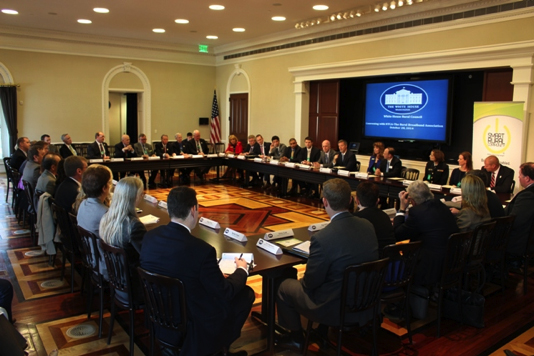
President Obama has made expanding broadband access a key priority throughout his Administration. He launched the ConnectED Initiative in June 2013, ensuring that 99% of our students will have high-speed broadband in their classrooms by 2017 and that broadband infrastructure will reach rural areas. The White House Rural Council has supported these efforts to expand access to affordable broadband networks to support community benefits such as education, health care, and job creation.
Just this week, the White House Rural Council hosted a dialogue with members of the NTCA - The Rural Broadband Association. NTCA members are rural, independent, telecommunication companies from across America. NTCA advocates on behalf of these companies to ensure that they can drive innovation and deliver service throughout rural America. Our dialogue was focused on NTCA’s Smart Rural Community initiative, which recognizes a small selection of NTCA members who are exceptionally serving their communities by using their broadband systems to improve health care infrastructure, education, government services, among other needs.
"By connecting every corner of our country to the digital age, we can help our businesses become more competitive, our students become more informed and our citizens become more engaged."
During the discussion, we heard from some of NTCA’s Smart Rural Community award winners. These winners represent telecommunication companies that have served their rural communities through broadband services. These companies sometimes serve fewer than 3 customers every 1 mile, but they have worked with their town councils, hospitals, local businesses, emergency responders, and schools to innovate and deliver broadband to their communities. Rural communities need broadband access for education, healthcare services, business, access to foreign markets, and more. Additionally, broadband companies are creating and supporting jobs and improving economic security in their communities. These award winners are providing the leadership and the vision for building future rural broadband companies and networks.
Our dialogue highlighted the team approach that the White House Rural Council is taking on telecommunications issues. Seated at the table and engaged in the discussion were not just White House officials, but also representatives from the U.S. Departments of Agriculture, Commerce, Health and Human Services, and Veterans Affairs, and the Federal Communications Commission. This diverse approach is aimed at innovative collaboration across agencies when tackling problems and developing solutions.
By holding these type of events, the White House Rural Council is able to engage stakeholders, hear feedback, and learn more about the issues facing rural communities in order to better serve rural Americans. This discussion with NTCA is just one example of how the White House Rural Council is engaged in strengthening rural America. For further information on the actions the White House Rural Council is taking, please visit our website.
Doug McKalip is the Senior Advisor for Rural Affairs in the White House Domestic Policy Council.


